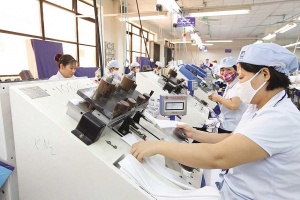INTERNATIONAL INVESTMENT
AND PORTAL
 Nguyen Huong Giang, partner of Tax and Legal Services at PwC Vietnam
Nguyen Huong Giang, partner of Tax and Legal Services at PwC Vietnam
Despite global economic and geopolitical challenges, Vietnam continues to stand out as a dynamic investment destination in Southeast Asia. In the first half of 2025, the country attracted approximately $22 billion in foreign direct investment (FDI), a 33 per cent increase compared with the same period last year. This surge reflects both Vietnam's strong economic fundamentals and investor confidence in its long-term growth prospects.
This FDI momentum is occurring amidst a sweeping transformation of Vietnam's tax and regulatory landscape. In response to global trends and fiscal pressures, Vietnam is implementing reforms across corporate income tax (CIT), capital gains, VAT, transfer pricing (TP), special sales tax (SST), customs, e-invoicing and tax administration. Efforts in digitization are also accelerating, with expanded e-invoicing and e-commerce oversight.
For foreign investors – especially those in manufacturing, logistics, technology, and infrastructure – understanding these changes is essential for maintaining compliance, optimizing cost structures, and mitigating regulatory risk.
Tax audits: more risk-based, data-driven enforcement
Vietnam's tax authorities continue to intensify their enforcement activities through targeted audits. In 2024, just under 63,000 audits were conducted, resulting in over VND16 trillion ($660 million) of additional tax assessments. This trend continues into 2025, with close to 26,300 audits in the first half alone – a 9 per cent increase from the same period last year – yielding VND8 trillion ($330 million) in collections.
Tax audits are increasingly risk-based, focusing on transactions with a higher likelihood of underreporting or misclassification. Key areas of scrutiny include:
Related-party transactions and transfer pricing Capital gains tax E-commerce and digital business platforms VAT refunds Fraudulent use of e-invoices Resource and mineral exploitation Chain and multi-level business models Residential property leasingForeign businesses operating in Vietnam should ensure proper documentation and maintain robust internal controls. Proactive audit readiness measures – such as document reviews, updated transfer pricing reports, and reconciled e-invoice systems – can help mitigate risks and facilitate smoother resolution if selected for inspection.
Vietnam's tax reform: navigating change in a dynamic landscape
Vietnam's taxation system is currently undergoing major reform to modernise, improve compliance, and align with international standards. Changes include CIT, VAT, TP, SST, customs, capital gain tax, e-invoicing and tax administration. Businesses must quickly adapt to these evolving regulations to maintain compliance.
These reforms are a clear indication of Vietnam's commitment to aligning with global standards while fostering a robust investment climate. Companies need to be agile and informed to make the most of emerging opportunities.
CIT reforms
Set for this October, extensive CIT law revisions include a flat-rate capital gains tax on foreign sales of Vietnamese companies, pending final rate details. Anticipated rates are 2 per cent for capital transfers and 0.1 per cent for securities, with further guidance needed for indirect transfers.
The law expands to cover foreign e-commerce and digital platforms. It changes the tax approach for overseas income, now taxed when earned, allowing credits for CIT paid abroad and aligning with international tax standards. New exemptions include income from carbon credit and green bond activities.
Revised CIT incentives are available for digital technology, semiconductors, AI data centers, and support services for small- and medium-sized enterprises, while industrial and economic zones lose some privileges.
Tax deductions for research, development, and investment are broadened. However, expenses non-compliant with relevant regulations and interest exceed a 20 per cent cap from non-credit institutions are non-deductible. The interest withholding tax rate will increase from 5 per cent to 10 per cent from October.
Critical changes in terms of VAT
Effective since July, the new VAT law expands the definition of 'taxpayers' to include foreign firms engaged in e-commerce and digital platform activities without permanent establishments in Vietnam. Organizations operating such platforms must also withhold and declare taxes for businesses utilizing them.
Changes to withholding tax rates affect foreign contractors, and several suppliers move from a 5 per cent VAT rate to the standard rate. Services provided by foreign digital platforms now incur the standard 10 per cent rate.
The revised eligibility requirements for applying 0 per cent VAT includes stricter rules, maintaining the consumption test for goods and services exported overseas or sold to non-tariff zones and export-processing enterprises to directly support export production. Digital content services offered to overseas customers require specific documentation, and the law clarifies the VAT treatment of 0 per cent VAT for in-country exports, leaving past challenged shipments open for further review.
Changes are made to the conditions that the respective seller must have declared and paid VAT on invoices for which the purchaser is requesting a refund. This will likely prove cumbersome and further restrict eligibility for VAT refunds.
VAT refunds will not be available in respect of goods which are imported and then directly exported or exported under consignment. This restriction will not apply to materials imported for use in export production or processing.
Transfer pricing and advance pricing agreements (APAs)
Decree 20/2025 expands the definition of related parties by including affiliates of credit institutions, while excluding third-party lenders or guarantors unless they are directly involved in "management, control, capital contribution, or investment" of the borrowing entity. Non-deductible interest expenses can be carried forward and deducted under certain conditions, with changes effective since 2024.
Anticipated to be finalized mid-2026, the new tax administration law is expected to accelerate the APA process. Decree 122/2025, effective since July, authorizes the Ministry of Finance and Tax Department to approve APAs, facilitating simpler conclusions than before.
Special Sales Tax law amendments
Starting January next year, the revised SST law broadens the tax base to include sugary beverages, and expands tobacco product coverage. Planned rate increases span until 2031, incorporating phased hikes for tobacco products, alcohol, and beer beginning in 2027, reinforcing public health priorities. Automobiles, particularly double-cabin pickup trucks, face revised SST rates starting in 2026.
SST refund policies change, excluding temporary imports and re-exports, and restructuring from eligibility, and clarifying refunds for exported goods based on actual exported quantities.
Key updates on customs
Vietnam has introduced pivotal reforms in customs procedures and import-export duties through Decrees 167/2025 and 182/2025, aligning these changes with Law No.90/2025/QH15. These reforms aim to streamline operations and clarify regulations for smoother trade activities.
Decree 167 introduces regulations for in-country export and import of goods (ICEI) and criteria for Authorized Economic Operators, effective from July 1. It revises inspection and re-import protocols to improve regulatory compliance.
Also effective since July 1 is Decree 182, which updates duty policies to support scientific and technological developments, extending exemptions for imported goods crucial to innovative sectors.
Amendments to Law No.90 formalize ICEI transactions by removing foreign trader “no presence” requirements and applying changes to pending customs declarations.
Goods sent to bonded warehouses and re-imported domestically may qualify for preferential duty rates if unchanged and supported by a certificate of origin.
Vietnam enacts Decree 236/2025/N D-CP to implement OECD's Pillar Two Framework
Vietnam has embraced the global tax reform movement by implementing Decree 236/2025/ND-CP as part of the OECD's Pillar Two framework, which aims to address tax base erosion by imposing a minimum tax rate on profits of multinational enterprises (MNEs) in all jurisdictions where they operate.
This decree, effective from October 15, targets MNEs with consolidated revenues from EUR 750 million ($876.2 million) and above, and ensures they contribute their fair share in taxes. Key components of the decree include the introduction of two mechanisms, the Qualified Domestic Minimum Top-up Tax (QDMTT) and the Income Inclusion Rule (IIR). The QDMTT is relevant to constitute entities (CEs) of foreign MNEs operating in Vietnam, while the IIR applies to Vietnamese-headquartered MNEs and their foreign CEs.
The new regulatory framework requires in-scope MNEs to submit comprehensive financial disclosures for compliance, including initial registration and detailed annual top-up tax return packages.
Furthermore, the decree recognises special circumstances, such as joint ventures, and provides specific methodologies for calculating applicable taxes in these situations. To ease the transition, Vietnam has incorporated relief measures applicable for the fiscal year beginning on or before December 31, 2026, allowing MNEs time to adjust to the new regulatory landscape.
This move reaffirms Vietnam's commitment to international tax standards, promoting transparency and fairness in the global economic environment while protecting its domestic tax base.
Tax administration reform
Law No.56/2024, effective since January this year, revises foreign supplier obligations, extending them to entities with permanent establishments in Vietnam. Enacted from April under this Law, e-platform management entities are required to handle tax matters for business households using these platforms.
Changes remove the ability to amend tax returns post tax audit announcement, but allow revisions of unaudited tax returns within 10 years from the filing deadline.
Under current law, a company's legal representative can be barred from leaving Vietnam due to unpaid taxes. A tax threshold for such bans is now set, and authorities must notify taxpayers of suspensions. Further guidance on the threshold level is anticipated.
Companies with successful tax appeals cannot claim interest on refunded amounts.
Invoicing regulations enhanced
Decree 70/2025 expands e-invoice registration for foreign e-commerce service providers, requiring data transmission to tax authorities as per the Tax Administration Law. Conditions for invoice issuance timing, error handling, and document adjustments are clarified.
Broader tax developments
The National Assembly's approval extends the 2 per cent VAT rate reduction through 2026, broadening the scope to include IT services and refined petroleum products. Compliance with electronic identification requirements under Decree No.69/2024 emphasizes Vietnam's digital transformation and data security initiatives, impacting businesses by mid-2025.
Decree 182/2024/ND-CP establishes an investment support fund for high-tech industries, offering financial benefits exempt from CIT – from operating to initial investment costs.
Final thoughts
Vietnam's evolving tax and regulatory environment reflects a push towards international standards, fiscal transparency, and digital enforcement. For foreign companies, these changes bring both new opportunities – particularly in high-tech and sustainable sectors – and increased compliance obligations.
Proactive planning, local team coordination, and engagement with tax advisers will be key to navigating Vietnam's new tax landscape and ensuring long-term operational efficiency.
 Proposed changes to interest deduction rules may be welcomed by taxpayers
Proposed changes to interest deduction rules may be welcomed by taxpayers
Decree No.132/2020/ND-CP sets out the rules on transfer pricing in Vietnam and has been in effect since 2020. Businesses often face challenges applying the rules in Decree 132 around interest deduction, particularly with regard to interest charged by credit institutions which are considered to be related parties for transfer pricing purposes. The Ministry of Finance (MoF) has proposed amendments to address these issues.
 Vietnam 2025 M&A outlook: trends, deals, and opportunities
Vietnam 2025 M&A outlook: trends, deals, and opportunities
Over the past decade, Vietnam's mergers and acquisitions (M&A) market has stood out as a significant force in Southeast Asia, fueled by the nation's strong economic growth, favorable demographics, and deeper integration into global supply chains.
 Vietnamese businesses navigate US tariffs
Vietnamese businesses navigate US tariffs
As US tariffs continue to pressure global trade, Vietnamese businesses are undergoing a comprehensive transformation, from supply chains and production to markets and services, to adapt and stay competitive.



















